If you’re looking to increase your sales, one of the best ways to do it is by cultivating your leads with the help of a sales leads database. A sales lead is someone who has shown interest in what you do and what you sell. They are more likely to convert into customers.
Becoming familiar with different types of leads and the best practices for generating and managing them will help you increase your ROI and build up your business.
- Click here to preview verified prospect lists
What is a sales leads database?
A sales leads database is an organized record of potential customers for businesses with various data points.
You can turn these leads into actual customers through your marketing efforts such as phone calls, emails, and other interactions. An excellent sales leads database will help you determine which leads are most suitable and promising so that you can prioritize contacting and nurturing them for maximum results.
It is essential to build a database of potential customers with verified and valid information. Data quality is crucial for a business to reach out to prospects and leads, and share information about its products and services.
What are sales leads and their importance?
Sales leads are the people who have indicated that they may be interested in buying a product or service from you in one way or another. They are the first step in a sales cycle.
Generating sales prospects and leads often takes a lot of time and effort if you start from scratch, an excellent sales leads database will help you find sales leads a lot faster.
These leads are important because they could turn into new clients and increase your revenue. The more sales leads you have, the more opportunities to close deals and increase your revenue.
- Click here to preview verified prospect lists
What does an ideal sales leads database look like?
A good sales leads database comprises highly accurate, organized data that can be easily searched, manipulated, and transformed into action items that help the sale team close deals.
The database should include:
- Individual records for all contacts at a company, including their name, title, job function, email address, and phone number. The more fields you have for each record (including social media handles), the better.
- Organized data allows you to segment potential customers by industry, region, and other important demographics.
- The database offers an easily searchable interface with an intuitive user experience for anyone on your sales team. It’s also helpful to include a “previous searches” section so reps can access the information they’ve already found easily at any time.
- It has to provide excellent support for first-time users and ensure its data is accurate and up-to-date.
- The last thing you should look for from a sales lead database is its pricing and free trials without the need to provide your credit card because as soon as you give access to your credit card, they can take money from you anytime.
Sales leads database vs. B2B Sales leads database
A sales leads database is a database of contacts or potential customers. A b2b leads database is a subset of the “sales leads database” category. It only contains contact information for businesses.
The main difference between a sales leads database and a b2b leads database is that the latter contains contact information and other data of people that are working for companies. Meanwhile, the former stores all types of information about anybody that it could find and think businesses would need them.
A sales leads database is helpful to generate leads for both consumer and business-to-business sales. Whereas a b2b database is designed to create business-to-business sales leads.
In general, a B2B sales leads database tends to be more professional than the one without the word “B2B” as its aim is to provide data about companies to companies and corporations.
- Click here to preview verified prospect lists
Top 5 Sales Leads Databases
1. LimeLeads
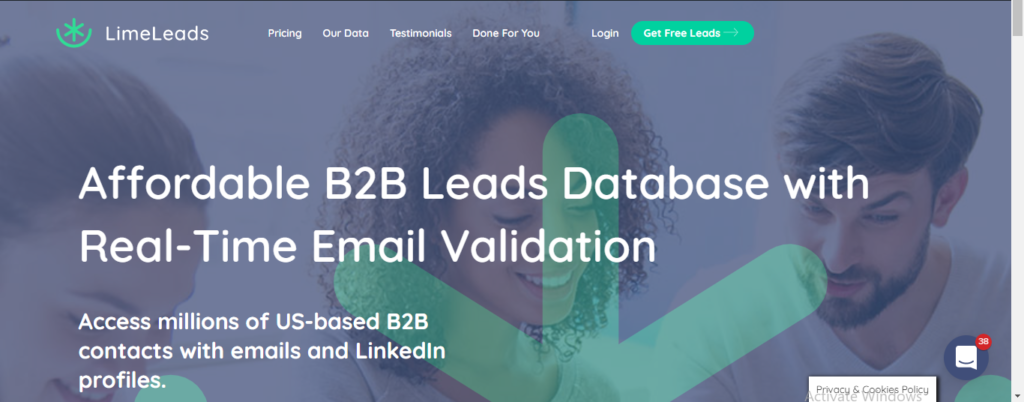
LimeLeads is a US-based B2B sales leads database with millions of contacts. It owns cutting-edge technology and works with some of the most reliable databases in the world to provide top-notch data with the highest accuracy. Limeleads collects and verifies contacts in real-time to ensure freshness and accuracy.
LimeLeads is an ideal B2B lead-generation tool for businesses. It provides different features to enable businesses to get easy access to millions of specific contacts with email addresses, phone numbers, job titles, and other contact information.
Limeleads also provides free trials and excellent customer support to help its users go about lead generation smoothly.
The pricing starts at only $29/month. Risk-free experience. No credit card is required!
Free Trials are also available, just click this link and register today.
- Click here to preview verified prospect lists
Pros
- It allows you to Preview/Share Unlimited Segments
- It has 2 layers of verification and collects contacts in real-time to ensure data freshness and accuracy.
- Very competitive pricing compared to others, it’s affordable for all businesses regardless of their sizes.
- Your credits never expire
- It has a Pay-as-You-Go feature
- Collaborators feature
- Excellent support is available any day of the week.
Cons
- It only provides USA-based contacts.
2. Salesforce
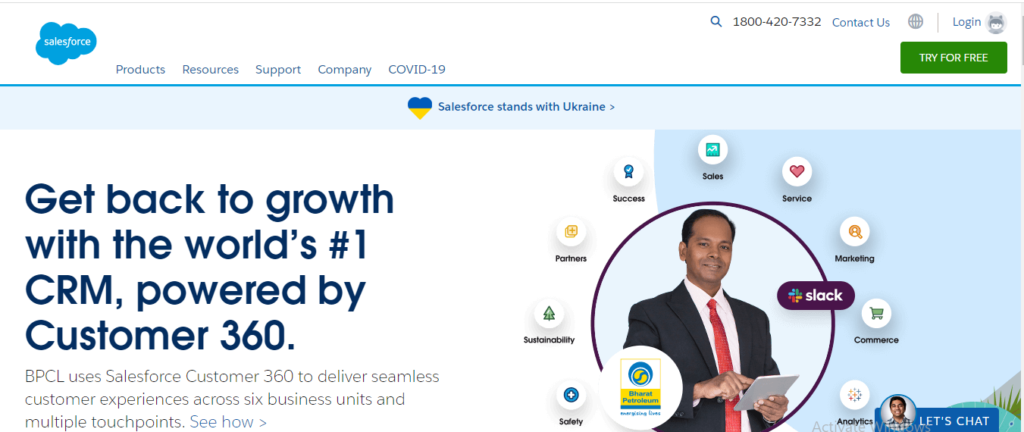
Salesforce is a comprehensive CRM software that offers sales teams a wide range of features. So it’s no surprise that it’s also one of the top sales lead databases CRM software.
Salesforce is divided into three categories: Marketing, Sales, and Customer Support. Sales and marketing automation allows you to track leads, create and send proposals, and keep your sales pipeline organized.
The price starts at $25/month (billed annually)
Pros
- It is one of the most powerful CRM tools
- It allows you to add features based on your needs
- Customer service is available quite fast.
Cons
- The configuration and setup process is complex
- You have to pay for most of the add-ons
- Billed annually
- It’s not a lead or prospect database for you to download contacts for outreach.
3. Data Axle Genie
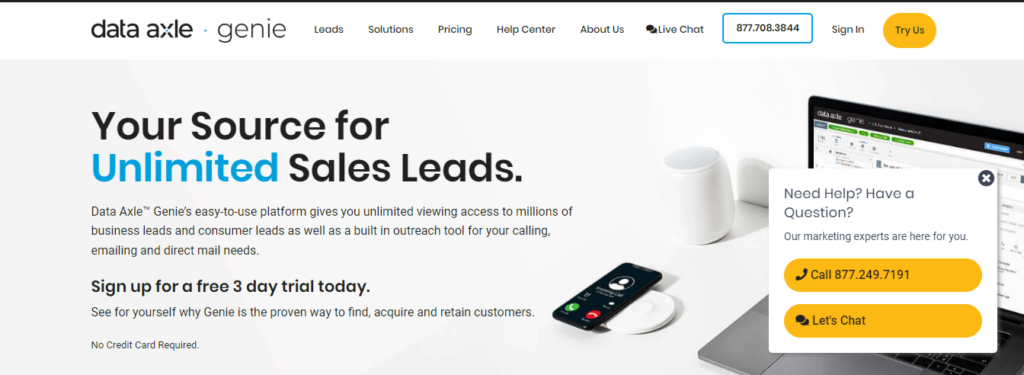
Data Axle Genie (formerly known as Salesgenie) is a database that offers access to millions of business contacts. It also includes information on company size, location, and type of business.
- Click here to preview verified prospect lists
Data Axle Genie offers email and mailing list creation tools. It also has lead scoring and nurturing tools. The database offers marketing automation solutions. It helps businesses to map customers & prospects, remove unwanted customers, and eliminate duplicate entries.
The price starts at $99/month.
Pros
- All the contacts are verified
- Additional tools are a surprise for the users
- Training and customer service are beyond expectations
Cons
- Email addresses are not included in the free trial.
- Exporting the contacts is a bit complex
4. DiscoverOrg
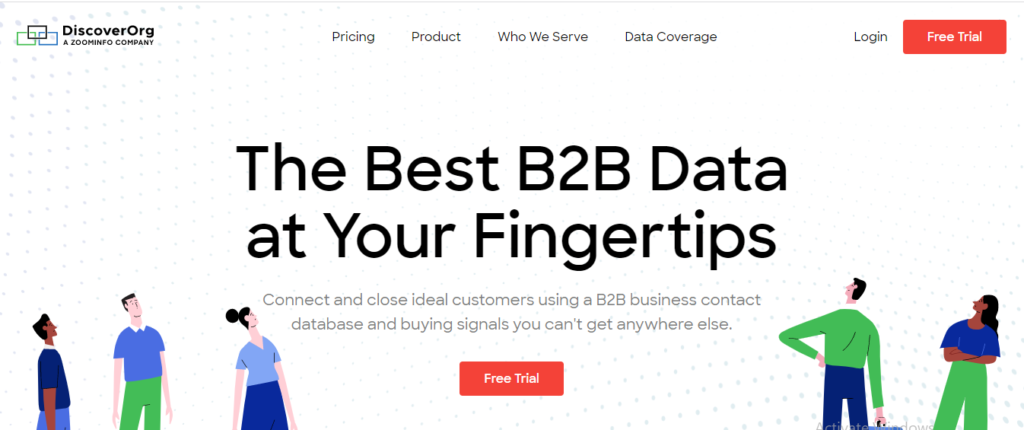
DisocverOrg helps you identify the target buyers and connect with them faster. It is a pretty well-known sales intelligence tool.
The database includes contact information for employees, IT decision-makers, and hiring managers. It offers sales and marketing teams solutions at B2B companies to improve their outreach efforts.
With DiscoverOrg, you can find companies with similar business models to your own. You can also get information about other businesses’ products and use that data to improve your sales tactics.
You have to contact the DiscoverOrg team to get the quote.
Pros
- The database has detailed account profiles
- It has a user-friendly interface
- It provides integration with other marketing automation tools
Cons
- Sometimes the data is outdated and not accurate
5. D&B Hoovers
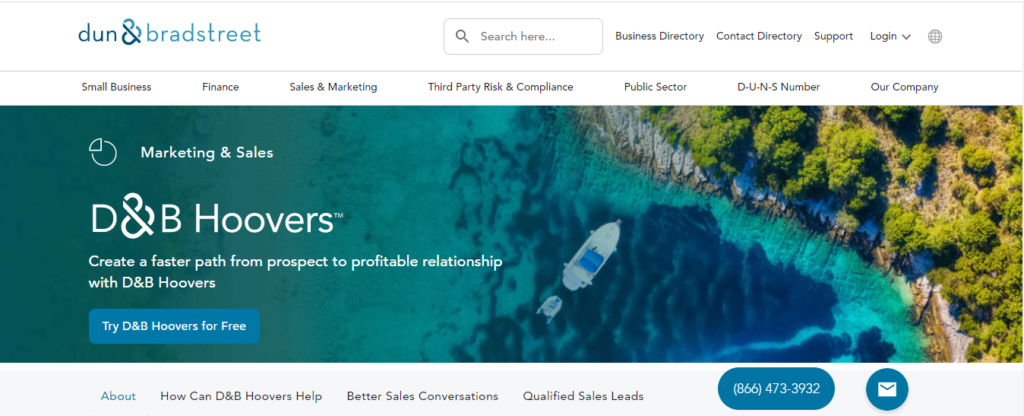
Hoover is a market research, lead generation, and competitive intelligence tool maintained by Dun & Bradstreet. It helps companies find contact information for sales leads, identify prospects and collect intelligence on competitors.
- Click here to preview verified prospect lists
Hoovers helps you find the right prospects to build your business with. Their sales solutions include several features. It has company profiles and executive contact information, news and alerts, private deal registration, and more.
The pricing starts at $89/month.
Pros
- The database offers high-quality contacts.
- The interface is easy-to-use with a customized dashboard
- It offers real-time insights and market research to accelerate sales
Cons
- It is an expensive solution for small and new businesses.
Which are the popular marketing strategies used to utilize Sales Leads Databases?
Sales leads databases are a crucial asset in the marketing landscape, providing businesses with a rich source of potential customers.
There are numerous popular marketing strategies that effectively utilize these databases to maximize lead generation and conversion.
These strategies encompass everything from customized email marketing campaigns to targeted social media promotions, all designed to cultivate leads and stimulate sales.
1. Cold emailing
Cold emailing is a prevalent marketing strategy that utilizes sales leads databases to connect with potential customers. Here’s an overview:
-
Targeted Outreach: Cold emailing entails sending personalized emails to individuals in the sales leads database who haven’t had previous interaction with your business. The objective is to acquaint them with your products or services and pique their interest.
-
Personalization: Despite the term, successful cold emails are often highly personalized. They leverage information from the sales leads database to address the recipient personally and customize the message to their interests or requirements.
-
Lead Nurturing: Cold emailing isn’t solely about immediate sales. It’s also a method to nurture leads by providing them with valuable content over time, gradually guiding them through the sales funnel.
-
Measurable: One of the benefits of cold emailing is its measurability. You can track metrics like open rates, click-through rates, and conversions to gauge the effectiveness of your outreach and make necessary modifications.
-
Scalable: Cold emailing can be scaled effortlessly. With the appropriate tools, you can send personalized emails to hundreds or even thousands of leads in your database.
Remember, while cold emailing can be effective, it’s crucial to adhere to email marketing laws to avoid penalties. Always ensure your emails offer value to the recipient and provide them with an opt-out option.
Click here to preview verified prospect lists
2. Hypertargeting ads
Hypertargeting ads is a prevalent marketing strategy that allows businesses to deliver personalized advertisements to a specific, highly defined audience using Sales Leads Databases.
This approach enables companies to maximize their marketing efficiency by reaching out to potential customers who are most likely to be interested in their products or services.
-
Data Usage: Hypertargeting involves leveraging detailed data from sales leads databases to pinpoint specific demographics, behaviors, or interests of potential customers. This data can encompass factors like email address, age, location, purchasing history, and more.
-
Customized Advertising: Based on the data, highly customized ads are crafted to cater to the specific interests and needs of the target audience. This could involve adjusting the ad’s message, design, or even the timing of its display.
-
Enhanced Engagement: As the ads are highly pertinent to the target audience, they are more likely to interact with them. This can lead to higher click-through rates, conversions, and ultimately, sales.
-
Efficient Expenditure: By targeting only those most likely to be interested in your product or service, hypertargeting can make your advertising expenditure more efficient. You’re not squandering money on displaying ads to those unlikely to convert.
-
Ongoing Optimization: Hypertargeting involves continuous testing and optimization. As you accumulate more data about what works and what doesn’t, you can fine-tune your targeting and enhance your results over time.
Remember, while hypertargeting can be highly effective, it’s crucial to adhere to privacy regulations and use data responsibly. Always ensure you have permission to use the data, and provide customers with an opt-out option.
3. Cold calling
Cold calling is a widely adopted marketing strategy that involves reaching out to potential customers who have not expressed prior interest in the product or service.
Click here to preview verified prospect lists
Leveraging Sales Leads Databases, businesses can identify and connect with a vast pool of prospects, thereby enhancing their outreach and conversion potential.. Here’s an overview:
-
Direct Outreach: Cold calling involves making unsolicited phone calls to individuals listed in the sales leads database. These are individuals who haven’t had any previous contact with your business.
-
Customized Approach: Successful cold calling often employs a customized approach. Using information from the sales leads database, the caller can adapt the conversation to align with the recipient’s potential interests or requirements.
-
Instant Feedback: One of the benefits of cold calling is the opportunity for instant feedback. You can assess the potential customer’s interest immediately and modify your approach as needed.
-
Lead Generation: Cold calling can be an effective method for generating leads. Even if the call doesn’t result in an immediate sale, it can lay the groundwork for future interactions.
-
Relationship Building: Cold calling allows businesses to establish relationships with potential customers. It offers an opportunity to build rapport and trust, which are vital for long-term customer relationships.
Remember, while cold calling can be effective, it’s crucial to respect the recipient’s time and privacy. Always ensure your calls offer value to the recipient and adhere to telemarketing laws.
